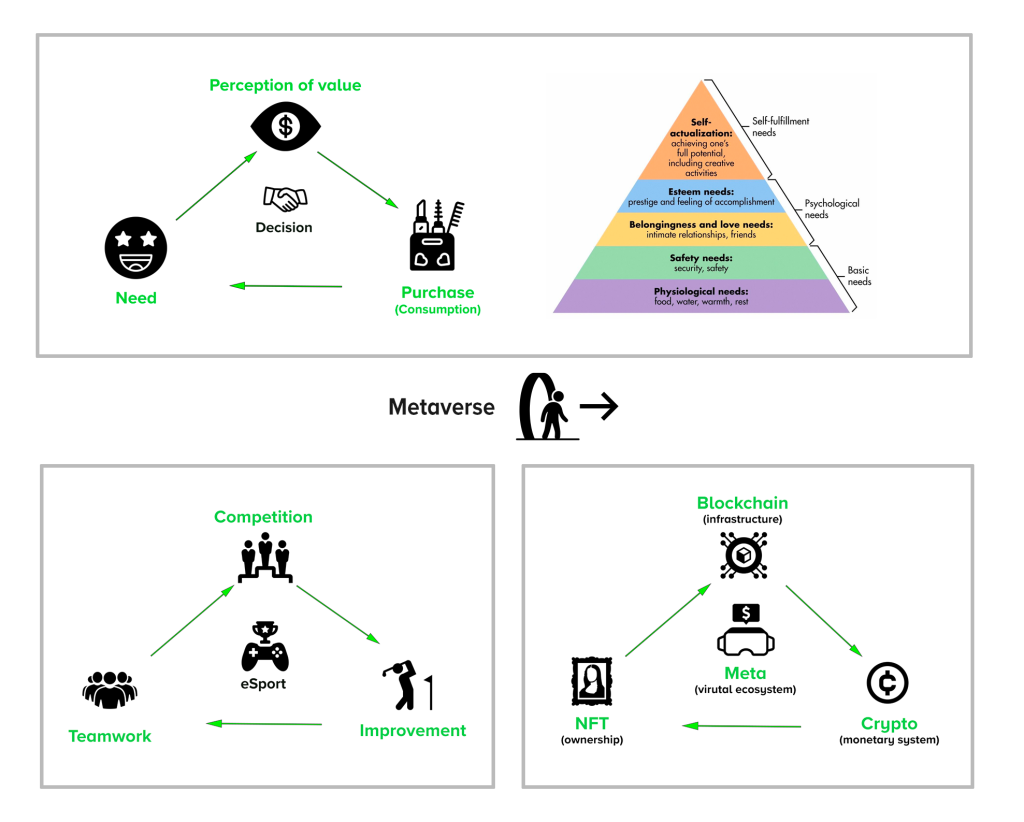We got to the point we would like to summarize all takeouts from the previous articles and take a critical look at the question: Are we going, Meta?
First, let me remind you what does it mean to “go Meta”? We are considering the possibility that people in the near future will be using Metaverse: A fully digital world where they can perform various activities (as we use computers or mobile devices now). Potentially on daily basis, as it will become a part of our lives.
If you have read the previous articles on this topic you will know till this point that we have a strong basis to make it happen. So the question arises… why it didn’t happen yet?
The answer is: that technology is not mature enough.
We ready as consumers
In terms of infrastructure, behaviour shift which is happening with new generations or the possibility of fulfilling our needs (top layers of the Maslov pyramid) – it seems we are ready. And I bet Mark and the other companies competing in their race to create Meta see that. The question is: WHEN technology will be ready to connect the dots and give people the possibility to immerse into the Metaverse? Just as a reminder I’ve created a summary graph showing you various aspects which are think are important to us to exist in the Metaverse:
1. Perception of value – shifting rapidly towards virtual goods
2. eSport and gaming are on the rise. People thrive in virtual worlds and there are more players globally year to year
3. We have infrastructure and tools which will help us to have ownership of the goods in virtual worlds
4. Yet, technology (headsets) is not mature enough. We still don’t have the holy grail – a convenient way to immerse into Metaverse. Hardware and platforms are in development and no matter what XR evangelists say – what we have so far is not enough. It’s still too bulky, too expensive and too.. nerdy.

The bigger picture
People have a need for discovery and adventure.
We are storytellers and at our core is the need to hear a story.
People want to see and experience new things. Some of us are travelling to long-distance countries, some just rent caravans and travel around the country, some are playing games and experiencing adventure there, and some would want to experience them in the Metaverse. Since the possibilities of the Metaverse are limitless, it could be a great medium for storytelling. It seems that there is a chance that the Metaverse could be our new level of interaction with the virtual world. But the next paradigm/UX shift (comparable to the mobile revolution) – it’s still far away from us.
Honourable mention goes to…
In writing the summary we need to mention two areas which can speed up technology adoption and ultimately lead to the situation we are discussing here – of going Meta. I’m talking about the sex business and the military. I wrote a special section on Gaming and eSport as I believe it has direct implications and impact on Metavers, but those two were always a catalysator when it comes to technology adoption.
The sex business
I didn’t pay attention to the sex business in a separate article since the experiments with real-time sex experiences (by real-time I consider real-time rendering like in 3D games) are… almost none. I did research and again – there are plenty of experiments, but I haven’t seen a product/video game we could call a real-time VR rendering experience. Of course, there are many reasons why. First of all rendering, a realistic human body is still expensive. And, even if there are games which are almost hyper-realistic (like Detroit: Becoming a Human) it’s much cheaper (and of course closer to reality) to shoot real actors with 360 cameras and put them in the environment/scenario we want. Of course, there is advancement in toys which make your intimate experience more tangible like KIIROO – interactive vibrating stroker and the other. But advancement in sex in virtual reality is not so huge as we could expected.
The military
On the other hand, the advancement in army is quite significant. The military is using both VR and AR to train their units, simulate different scenarios or even use those technologies in real time action (like steering drones or even veciles and robots). There are already a lot of matured products on the market like Refence. Air Force is actively using VR to train their pilots. So in this field I believe it could be big leap trough adoption. But… as we can imagine only the fraction of news is coming to the public information so my assumption is it’s much more advance as we can imagine.
Summarizing
In 2020 year Gartner (the renowned analytic company which predicts the future, technology adoption and maturity) consider VR and AR as matured technologies and removed them from the Hype Cycle. In my opinion, we are still away from understanding and using its possibilities. Or at least my expectations from Metaverse are different.
For sure the first company that delivers a smooth Metaverse experience backup with easy to use hardware will be a winner. There is a lot at the stake – we are talking here about a paradigm shift which will replace ultimately computers/keyboards and touchscreens. Will it happen in the next 5 years? I’m sceptical. 10 years -maybe. But I think we are aiming for long-run development (around 15+ years). So the limitless possibilities of Metaverse yet so close are still out of our reach.
We are still observing Meta, Apple, and the others compete to create the next step of experiencing virtual reality. And ultimately hold the key for it – which comes with great responsibility. But this is a topic for another article. Thank you.
All articles on this topic:




